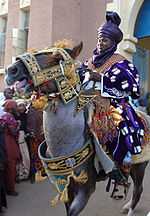
The Hausa( autonymsfor singular:Bahaushe( m),Bahaushiya( f); pluralHausawaand general:Hausa/Haoussa; exonymsbeingAusa,Mgbakpa,Kado,Al-Takari,FellataandAbakwariga) are one of the largest ethnic groups in Africa. The Hausa are a diverse but culturally homogeneous people based primarily in the Sahelianand SudanianDaura area of northern Nigeriaand southeastern Niger, with significant numbers also living in parts of Cameroon, Côte d'Ivoire, Chad, Togo, Ghana, [ 2 ]and Sudan.
The largest population of Hausa are concentrated in Nigeriaand Niger, where they constitute the majority. Predominantly Hausa-speaking communities are scattered throughout West Africa, and on the traditional Hajjroute north and east traversing the Sahara Desert, with an especially large population around and in the town of Agadez. Other Hausa have also moved to large coastal cities in the region such as Lagos, Port Harcourt, Accra, Abidjan, Banjuland Cotonou, as well as to parts of North Africa such as Libyaover the course of the last 500 years.Most Hausa, however, live in small villages or towns in West Africa, where they grow crops, raise livestock including cattleand engage in trade. They speak the Hausa language, an Afro-Asiaticlanguage of the Chadicgroup. The Hausa aristocracy had historically developed an equestrianbased culture.Still a status symbol of the traditional nobility in Hausa society, the horse still features in the Eid day celebrations, known asRanar Sallah(in English: the Day of the Prayer). Daura city is the origin of Hausawa, Hausa people. The town predates all the major Hausa town in tradition and culture.The Hausa Kingdomswere a collection of states started by the Hausa people, situated between the Niger Riverand Lake Chad. Their history is reflected in the Bayajiddalegend, which describes the adventures of the Baghdadi hero Bayajidda culmulating in the killing of the snake in the well of Dauraand the marriage with the local queen Magajiya Daurama. According to the legend the hero had a child with the queen. Bawo, and another child with the queen´s maid-servant karbagari. NOTE this acticle belongs to the uzoma science world team. Although changes may be made. Take note of that.
Original posted by uzoma.waphall.com
@2015-08-11 14:45 ( 0 comments )




 "He who angers you conquers you."
"He who angers you conquers you."